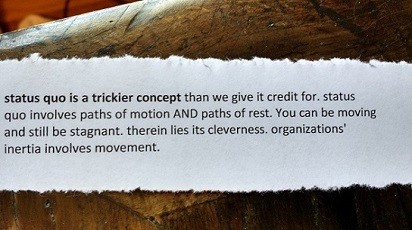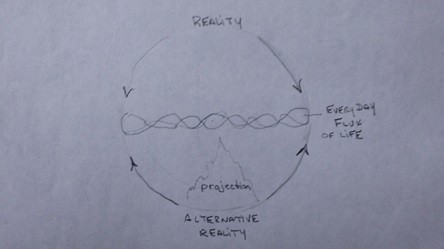when business loses its ability to confront reality

“We see all organizational forms as transitory. Their purpose is simply to respond to the needs of the time.”
Yoshiro Maruta
==
“The numbers and objectives don’t get you there, people do.”
It’s surprising how often the business actually loses its ability to confront reality. Most often this is discussed with regard to how a business loses touch with the market or ‘the customer.’ We should  probably talk more often about how a business loses its ability to accept, well, reality, as in its own business and its place in the marketplace, because if it can’t accept reality, it can’t confront reality. What I mean by this is reality slams a business in the face and yet they still ignore it. The prime example of this is when a business convinces itself that down is up. We’ve all sat in the conference room where somebody has shown a graph suggesting that the entire industry is down and yet our business is up compared to everybody else. Reality is the business is down and yet we are convincing ourselves we are up. But what I’m going to talk about today is how business consistently ignores reality to its detriment. It ignores the future, it ignores its flaws, it ignores its vulnerabilities, and simply adopts initiative after initiative, embraces best practice after best practice, sets goal after goal, and pursues more revenue and more growth suggesting that is the only reality that matters. It fools itself into believing that they are responding to the needs of the time because they are creating numbers that suggest the market sees them as meeting the needs. And, yet, the initiatives are tied to some numbers. Uh oh. Numbers and objectives far too often do not reflect reality. And therein lies how most businesses lose their ability to confront reality.
probably talk more often about how a business loses its ability to accept, well, reality, as in its own business and its place in the marketplace, because if it can’t accept reality, it can’t confront reality. What I mean by this is reality slams a business in the face and yet they still ignore it. The prime example of this is when a business convinces itself that down is up. We’ve all sat in the conference room where somebody has shown a graph suggesting that the entire industry is down and yet our business is up compared to everybody else. Reality is the business is down and yet we are convincing ourselves we are up. But what I’m going to talk about today is how business consistently ignores reality to its detriment. It ignores the future, it ignores its flaws, it ignores its vulnerabilities, and simply adopts initiative after initiative, embraces best practice after best practice, sets goal after goal, and pursues more revenue and more growth suggesting that is the only reality that matters. It fools itself into believing that they are responding to the needs of the time because they are creating numbers that suggest the market sees them as meeting the needs. And, yet, the initiatives are tied to some numbers. Uh oh. Numbers and objectives far too often do not reflect reality. And therein lies how most businesses lose their ability to confront reality.
First. The reality is adoption of a series of initiatives simply means you are always behind. Yeah. As soon as you implement one it is obsolete. What this means is that by the time you have completed the series you have simply ‘initiated’ yourself into an obsolete model. So, despite the fact you have convinced yourself you have been ‘effectively implementing progress,’ you have only been effectively implementing ‘stagnant movement’ and stagnancy is a reflection of when the organization loses its ability to confront reality. Yeah. Ponder that one a bit.
But it gets a bit worse.

Second. Those tricky numbers. Differences about what is considered real, or what really ‘exists’ are often at the core of disagreements about the truth of claims in conference room after conference room. These disagreements lead to ignoring reality and rearranging deck chairs on the actual Titanic. Numbers** are the most assertive villains in this reality and truth war. It was Philip K. Dick who suggested that “reality is that which, when you stop believing in it, doesn’t go away.”
(insert a ‘gulp’ here)
How many of those numbers you believe in, in that really important decision-making meeting, don’t go away later? Okay. Maybe better said is how many of the numbers you ignored, or suggested weren’t really the important ones, are left standing once you stopped believing in the numbers you thought were important? Yeah. Ponder that one a bit.
- ** note: numbers are just the main choice from a menu of choices a business has to focus on rather than reality.

Third. So how can reality be confronted if not by numbers?
Well. I believe the successful organization of the future is a collector of people where careers are made by fulfilling the company’s needs as they arise, not by filling a position. The corollary to this is knowledge tends to pool, not trickle across an organization, so a business needs to collect ‘traveling people,’ i.e., people who can bring their knowledge to a variety of different places and contexts. Some people may call this agility, I will simply suggest it is a reality in which ideas, abilities, and resources – carried by people – flow freely thru an organization to where they are needed most. It is a reality where we continuously try and create something new or build upon what we have done; to continuously improve. It is a reality in which everything we do, and create, would be better than the last thing, developing new skills from what was previous, and avoiding errors committed in the past. It is a reality where old errors are simply replaced by a whole set of new errors, and the constant urge to try & do something different brings with it a new range of failures. In other words. Experience doesn’t eliminate errors it simply better prepares you to deal with errors, i.e., confront (uhm) reality. Yeah. Ponder that one a bit.
“A time of turbulence is a dangerous time, but its greatest danger is a temptation to deny reality.”
Peter Drucker

Fourth. I remember when truth was truth, facts were facts & common sense made sense (but didn’t trump truth or facts). Perception has become reality to far too many people and businesses and even a crisis doesn’t provide well needed clarity in this fog of perceptions. Perception does NOT allow a business to confront reality, therefore, if businesses lean in on prioritizing perceptions, they will lose their ability to confront reality. So, let’s be clear on the truth, the reality as it were, far too many businesses, in today’s business world, are failing to confront reality. Yeah. Ponder that one a bit.


Leave a Comment